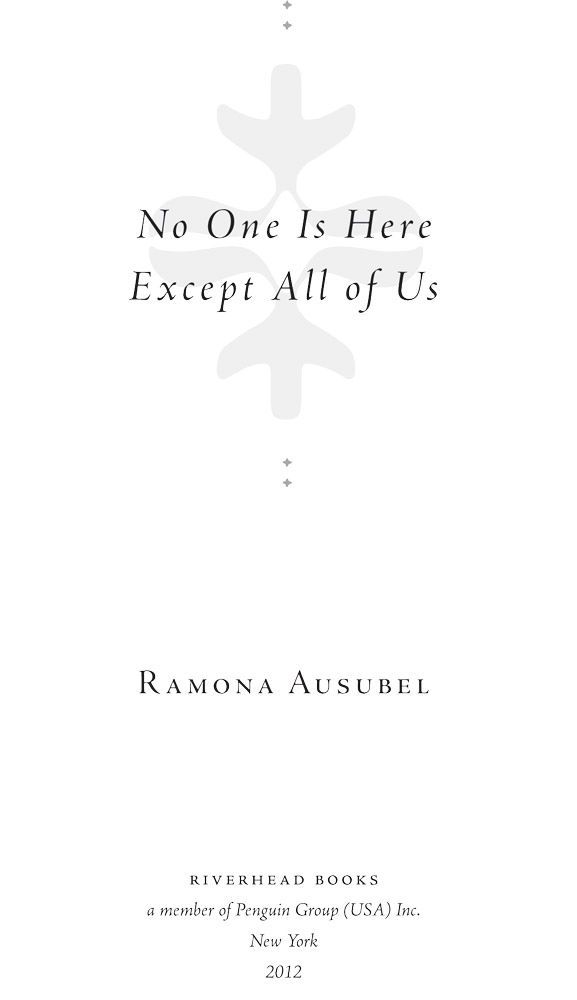
No One is Here Except All of Us
کتاب های مرتبط
- اطلاعات
- نقد و بررسی
- دیدگاه کاربران
نقد و بررسی

November 14, 2011
Ausubel’s debut novel about survival and storytelling begins in 1939 as nine Jewish families that make up the northern Romanian village of Zalischik decide—as war threatens to consume all of Europe—to “start over” by retreating into an imaginary, alternative history and remaking their world. Aided by a mysterious pogrom survivor who appears in their village, these families reinvent themselves, reassigning relationships, occupations, even ages, believing against reason that this new version of events will keep them safe, for, they hope, “this world is about hope more than events.” At the center of the effort and the novel is Lena, the 11-year-old daughter of the village cabbage farmer, who must maintain the thread of narrative even as she is adopted by her aunt and uncle, married to the banker’s unlucky son, Igor, and becomes a mother. When the outside world finally intrudes on the village idyll, Lena must accept that her duty is “to survive to tell what happens,” and she sets out on a journey that will deprive her of everything but her will to keep telling. Despite hints of beauty and meaning, the novel’s combination of magical realism and traumatic history feels forced, undermining its theme of the power of storytelling. Agent: Janklow & Nesbit Associates.

April 15, 2012
A bittersweet fable of war and survival set in a Romanian shtetl. Like Chagall's art, charming or cloying depending on taste, Ausubel's fanciful novel employs an intensely imaginative style both to evoke Zalischik, a remote Jewish settlement in 1939, and also to fuel her story. As news of the encroaching anti-Semitic terrors filters into the village via the horrific experience of a half-drowned stranger, the community tries to hold the world at bay with its imagination while cutting itself off from external contact. The narrator, 11-year-old Lena, must endure a parallel delusion. Given by her loving parents to her barren aunt and uncle, she is pushed rapidly through the stages of childhood again as her partly-deranged new parents teach her to talk and walk, then arrange marriage to Igor, the banker's son. Happiness and children follow, but the village's isolation can't last. After Igor is taken prisoner, Lena flees into the woods where her baby dies and farmers offer her an impossible choice. Returning to Zalischik where she learns the fate of her people, she finally turns to a future in the New World. Ausubel's sustained, idiosyncratic take on the Holocaust is double-edged, alternating affecting heartache with sentimental poetic overkill. Opinion may be divided, but there's an undeniable element of talent here.
COPYRIGHT(2012) Kirkus Reviews, ALL RIGHTS RESERVED.

September 1, 2011
When danger threatens, would that we could simply change reality's rules. That's what one little Romanian village tries to do in 1939, as war thunders on the horizon. At the suggestion of an 11-year-old girl and a stranger who's washed into their midst, the townsfolk decide that they can hold danger at bay by using their imagination; they completely remake their lives by throwing out everything they once knew, reassigning jobs and even spouses, and forgetting history altogether. It works for a while, but eventually our heroine grows up and must leave the village's parameters to save her husband and children. A wonderfully fresh and inventive premise replicating exactly what literature can do, and award-winning debut author Ausubel reputedly writes with warmth and flare. I'm excited about this one.
Copyright 2011 Library Journal, LLC Used with permission.

January 1, 2012
For the nine Jewish families who live in a valley in northern Romania in 1939, the troubles in their part of the world are known but distant. Then a woman who is the sole survivor of her ravished village washes up on the riverbank, and she, assisted by narrator Lena, suggests starting over, building a new and perfect world, with no memories of the painful past. With the barn as its temple and the stranger as its spiritual leader, the small village is bypassed by troops for years, until one day when three soldiers arrive and carry off Igor, Lena's husband, a man who specializes in sleeping. Taking her children, Lena leaves, with the admonition that she survive to tell what happens. While Igor is a pampered prisoner in Sardinia, Lena endures unimaginable hardships and wrenching losses. Ausubel uses the history of her own great-grandmother as the framework for her first novel, which fully evokes the horrors of the Holocaust by merely touching on events. A fabulist tale of love, loss, faith, hope, community, and, especially, the power of story.(Reprinted with permission of Booklist, copyright 2012, American Library Association.)

























دیدگاه کاربران